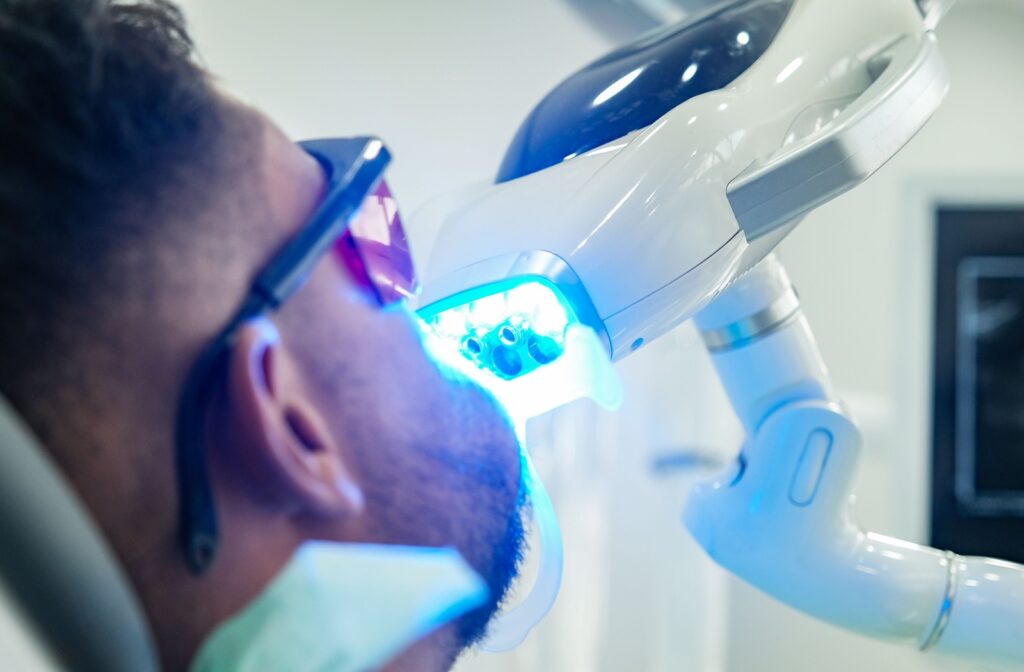
A bright smile is one of the first features people notice about you; everyone deserves a radiant smile. For those with discoloration concerns, teeth whitening is a popular and effective way to remove stains and refresh your smile.
It’s natural to wonder if the procedure could harm your teeth. Fortunately, professional teeth whitening treatments, when done correctly, do not damage enamel. The key lies in choosing safe methods and following recommended guidelines.
Understanding how teeth whitening works, the types of treatments available both in-office and at-home, and the risks associated with improper use can help you achieve the results you desire without compromising your oral health.
How Teeth Whitening Works
Teeth whitening treatments typically use bleaching agents such as hydrogen or carbamide peroxide. These agents penetrate your enamel—the outer, protective layer of your teeth—to break down stains into smaller particles.
By breaking down these accumulated particles, your teeth appear whiter and brighter.
Why Teeth Appear Discoloured
Contrary to popular belief, teeth aren’t naturally bright white. Your tooth colour is determined by your dentin, the softer tissue beneath the enamel, which naturally has a slightly yellowish hue. Over time, enamel can become stained from foods, beverages, smoking, and natural aging.
Bleaching Agents & Enamel Safety
Professional whitening agents are carefully tested and formulated to penetrate enamel safely and effectively. The concentration of the whitening solution and the controlled application by dental professionals help your tooth enamel remain healthy and intact.
Types of Teeth Whitening Treatments
Various teeth whitening methods are available, from convenient at-home options to professional treatments conducted in a dental office.
At-Home Teeth Whitening Options
At-home options are accessible and convenient but vary in terms of results:
- Whitening toothpastes contain mild abrasives that remove surface stains but do not penetrate deeper discolouration
- Pre-coated whitening strips contain low concentrations of bleaching agents & are applied directly to teeth; results vary, & strips might not uniformly whiten teeth
- Whitening kits, including custom trays or strips and bleaching gel, can offer improved results compared to toothpaste or basic strips, but effectiveness depends heavily on consistent & correct use
Professional Teeth Whitening Options
Professional whitening treatments can offer more dramatic, lasting, and safer results:
- In-office treatments use high-concentration bleaching agents under carefully controlled conditions, providing immediate & noticeable results
- Professional take-home kits use custom trays with professional-strength gels provided by your dentist to support safe, effective whitening from home
Potential Risks of Teeth Whitening
When used improperly or excessively, teeth whitening products can potentially cause some side effects. Being aware of these risks can help you understand how to mitigate them.
Tooth Sensitivity
Tooth sensitivity is the most common side effect of teeth whitening.
The bleaching agents temporarily open tiny channels in your enamel, making your teeth sensitive to temperature. While temporary, it can be uncomfortable. Sensitivity typically resolves on its own within a few days.
Gum Irritation
When whitening agents come into prolonged contact with gums or soft tissue, it can cause irritation or chemical burns. Professional whitening treatments significantly reduce this risk by carefully applying whitening solutions and protecting surrounding tissues.
Enamel Erosion
Overusing or misusing whitening treatments, particularly highly abrasive or acidic DIY remedies, can thin the enamel layer. Exposing more dentin increases sensitivity and creates a more yellowish appearance over time.

Promoting Safe Teeth Whitening
You can effectively whiten your teeth without damaging your enamel with a few precautions.
Consult with a Dental Professional
Before starting any whitening treatment, discuss your options with your dentist. A dental professional can recommend treatments suited to your oral health, identify potential risks, and tailor the whitening approach to your needs.
Follow Instructions Closely
Always follow the provided instructions on whitening products carefully. Avoid extending usage times or frequency, as these increases don’t necessarily improve results but can heighten risks.
Choose Approved Products
Confirm that any product you use is approved by dental health organizations and your dentist. Unverified or overly abrasive home treatments should be avoided.
Maintain Regular Dental Visits
Professional cleanings and check-ups can help your enamel stay healthy by detecting any early signs of damage or erosion. Regular dental care helps maintain the results of whitening treatments and prevents long-term complications.
Alternatives to Traditional Teeth Whitening
For people mindful about protecting their enamel, or if you naturally have thinner enamel, consider alternative treatments that achieve a brighter smile without traditional bleaching.
Dental Veneers
Veneers are thin shells made from porcelain or composite resin that are bonded to the front surfaces of teeth, instantly enhancing colour and appearance.
Veneers offer a long-lasting solution and are particularly useful for severe stains or structural imperfections, including chips or uneven teeth.
Dental Bonding
Bonding involves applying tooth-coloured composite resin directly onto teeth to cover stains or correct minor imperfections. It’s a minimally invasive, affordable alternative offering immediate cosmetic improvement.
Regular Professional Cleanings
Routine dental cleanings can remove surface stains and tartar buildup, providing a natural brightening effect. Regular professional care maintains oral health and naturally enhances the brightness of your smile.
Frequently Asked Questions About Teeth Whitening & Enamel Health
Patients often have additional questions about teeth whitening safety. Here are answers to common inquiries.
Is Professional Whitening Safer Than Home Whitening?
Professional treatments are conducted by trained dental professionals who control application, concentration, and timing, significantly reducing the risk of sensitivity, irritation, and enamel damage.
How Often Can I Safely Whiten My Teeth?
Most dentists recommend professional whitening treatments no more than once per year, supplemented with safe, dentist-approved maintenance products at home between visits.
Will Whitening Make My Teeth Permanently Sensitive?
Tooth sensitivity after whitening is typically temporary and subsides within a few days. Desensitizing toothpaste or treatments from your dentist can alleviate this discomfort.
However, if you experience persistent or intense sensitivity, your dentist can recommend personalized treatment options.
Brighten Your Smile Safely at Little Italy Dentistry
Teeth whitening can safely provide stunning results when performed correctly. You can safely achieve a brighter smile by following your dentist’s recommendations and maintaining proper oral hygiene.
At Little Italy Dentistry in Toronto, our dental team is dedicated to protecting your smile. Our priority is providing a safe, effective, and comfortable teeth whitening experience. We’ll help you select a suitable whitening method and provide guidance to maintain lasting results.
Ready to brighten your smile safely and effectively? Book your consultation today to discover the professional difference at Little Italy Dentistry.


